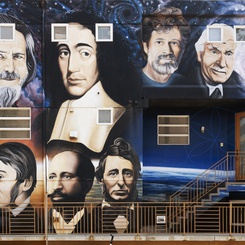Xavier Pavie is a professor of innovation. He’s the Academic Director of the Master in Management Grande Ecole in Singapore and the Director of I-magination Center. In this interview, he stressed out the importance of responsible innovation.
−−−
V.G.: Today we are facing many disruptive innovations. A great example of what we call “a disruptive innovation” would be Elon Musk, a visionary entrepreneur who is the owner of many companies such as Space X, the company that launched the “Falcon Heavy”.
Xavier Pavie: The most important and maybe the most interesting thing about Elon Musk is that he decided to create a new paradigmatic approach of space, of how we explore space and of the way we launch satellites, and, who knows, maybe of the way we send people over to Mars as well. For the last, let’s say, 50 years or so there has been a shift in our approach to innovation. If you look at the different myths, you will quickly realize that the idea is not really new. We have always wanted to extend our lives, to become immortal. Look at Icarus, Prometheus, the fountain of youth. We want to be immortal. That is not new. What is new is that we might be closer to achieving it than we were ever before. Indeed, what if it were possible to be immortal; what if instead of fixing a problem, we were only looking for better-performing solutions?
V.G.: We, as human beings, can we even say that we are the result, the sum of innovations. What are the challenges? Should we be scared?
Xavier Pavie: We have always been scared of innovations. And there is one very interesting aspect to innovation called uncertainty. You never know how people will react to your innovation, you do not know what they will make of it. This is the case with Facebook, it is also the case with guns. You are unaware, in a certain way, you cannot imagine every possible consequence resulting from your innovation. Therefore, it is not a question of whether I am afraid or not of what is going on, it is a question of whether I am afraid of what it is used for. So, it is always a question of responsibility. You are to make sure of its responsible usage. We will probably bring up the question later on in this interview but the most important thing is not the innovation itself. To fear innovations is absurd. We should fear innovators instead. Innovation reminds me of the argument gun lobbyists advance: “guns never killed anyone, men did”, which is true actually. But we should not forget who put the guns in the hands of the murderers. Innovators did. Innovation is not the real issue here. Innovators are.
V.G.: It was what the Facebook -Cambridge analytica data scandal was all about, was it not?
Xavier Pavie: Yes, absolutely. The problem with Cambridge Analytica is not the collection of data, the problem was the way some people used that data, in a very irresponsible way of course. They were serving their own personal interests, and that is the real problem. We don’t care about data, data issues are not new. The question is the purpose lying behind.
V.G.: The same goes for the Internet and… how it’s used by the Chinese Communist Party, for example, right?
Xavier Pavie: Absolutely. 30 years ago when we developed the internet, it was supposed to give us more freedom, to connect us to other people and to allow us to exchange information. Internet was a mere tool supposed to improve the collection of information; supposed to spread ideas, to collect ideas. But look at the current situation: it is used to check people’s identity, to control them, which is the case in China.
V.G.: How can innovation be responsible, and should it really be?
Xavier Pavie: Actually, we have to think twice before saying “yes” to all of our clients’ demands and expectations. There is a gap between what my client wants and what I should do to satisfy their need. They want better smartphones, better batteries, better computers. In other words, most of the time, we understand innovation as the answer we should give to our clients’ needs. So, we are customer-driven. The question is: should we give an answer to every single need they have? In a decade, we have had more than 10 generations of iPods and iPhones. But how is an iPhone produced? How are products managed at end-of-life? There lies the innovator’s responsibility. Innovators should question the request and be able to say “no”.
Consumers are not engineers. They are not always aware of the (environmental) impact their demands can have. You want to have a touchscreen? That is great, but did you know you needed natural resources to make one, and that in producing the number of touchscreens we are producing, we are exhausting our planet’s natural resources. They are not renewable. We only have one planet. What would happen if everybody could, if they wanted, have a smartphone, a car, a helicopter?
Do we always have to look for an answer? Probably not. We should instead weigh the consequences (as far as possible) of our clients’ demands. Let us take a look at Facebook. We have to absorb the fact that every social share has an impact and that at some point it may be used (against us). All this is part of what we call the direct impact of innovation. But there is also what we call the indirect impact of innovation. You are not only harming your client but the entire ecosystem.
Let us take the example of nanoparticle silver. Valued for its antibacterial and odor-fighting properties, nanoparticle silver is the star attraction in a range of products from socks to bandages to washing machines. But as silver’s benefits propel it to the forefront of consumer nanomaterials, scientists are recommending a closer examination of the unforeseen environmental and health consequences of nanosilver.
To sum up, to be responsible we have to ask ourselves three questions:
- Should I give an answer to the need?
- What is the direct impact of my innovation?
- What is the indirect impact of my innovation?
V.G.: In that context, what is the role of philosophy? What does philosophy add to our comprehension of innovation, of society and the world we live in?
Xavier Pavie: Innovation is supposed to bring transformation in order to survive in a highly competitive environment. Innovation comes from the Latin world innovare: in means inside and novare - change. You need to change something inside someone or something.
Most of the time, what do companies do? Faced with clients’ demands, they almost never weigh the consequences of the innovation they are going to introduce on the market. Which discipline could accompany them if not philosophy? The role of philosophy is to question what we do. If we never put into question our way of thinking, we are simply looking to deliver what our clients want and that is all.
V.G.: We are now going to take one question from the audience. The question is: Is there a way to stop innovation or simply hold it back?
Xavier Pavie: That is a very good question because it allows me to draw the difference between invention and innovation. Invention is just an idea, sometimes a prototype or a mock-up, but it does not necessarily mean innovation. And it is hard for a company to “prevent” innovations from happening because the competitors will seize the opportunity. So, the problem lies in the existing tension between making profit and being responsible.
To fix this problem, we need to include responsibility in the process. To innovate we have what we call the Innovation Process Management (IPM). Now, the purpose is to have a responsible IPM. It is about including responsibility, questioning, philosophical approach and reflection at every single stage of innovation.
V.G.: What you just said reminds me of philosopher Hans Jonas and his theory...
Xavier Pavie: The philosopher Hans Jonas said that we have to develop a principle of responsibility, which is different from the precautionary principle, because most of the time, when we don’t know something, and we don’t know what are the consequences, we will say something like: “hold on, we won’t do”. The problem is, in a globalized economy, someone else on the other side of the globe will do. Therefore, you can do, if not someone else will do, but stay alert and monitor carefully!








